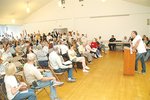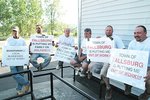WOODBOURNE — The depth of the public split over a proposed residential building moratorium in the Town of Fallsburg was dramatically evident Monday.
The Woodbourne Firehouse's parking lot was …
This item is available in full to subscribers.
Please log in to continue |



WOODBOURNE — The depth of the public split over a proposed residential building moratorium in the Town of Fallsburg was dramatically evident Monday.
The Woodbourne Firehouse's parking lot was packed with cars, and residents and contractors held signs for and against the idea.
Inside, nearly three dozen speakers argued whether a yearlong prohibition on the creation of five or more residential units (single-family homes aren't affected), residential subdivisions and hotels/motels would help or harm the township.
The number of speakers pro and con were almost equal. Thus, at the end of Monday's public hearing, Supervisor Steve Vegliante observed, “This board has a lot to think about over the next week.”
Pro-moratorium
“This moratorium is not about stopping growth,” said Woodbourne resident Luther Hitt, who colorfully described it thusly: “You cannot put six gallons of poo in a five-gallon pail.”
The metaphor proved applicable, as much of the evening's debate focused on town officials' contention that Fallsburg's municipal sewer system is nearly at capacity.
“You smell that smell?” asked John Wallace, who works at the town's wastewater treatment plant in South Fallsburg.
He was referring to the odor that wafts across nearby Route 42 during the summer.
“That is not the lack of us doing our job,” Wallace remarked. “That's the point where the sewer plant cannot handle what's coming in.”
He argued the moratorium is 5-10 years overdue and will not harm contractors or the seasonal community on which they depend.
“The people who come here in the summer are part of our community,” Wallace acknowledged, “and we need to respect them as we do the people who are here in the winter.”
But pro-moratorium comments weren't solely about sewer capacity.
“Our water quality changes in the summertime because more people are drawing from wells,” Mountaindale resident Erna Hutchinson told the town board. “... We really need to take the time, for everybody's benefit.”
The amount and pace of development has intensified in recent years, with thousands of units proposed or under construction townwide.
Kalika Stern, a resident of South Fallsburg, said she fears water runoff issues from 439 homes proposed to be built near her property, while fellow South Fallsburg resident Tina Hazarian said she'd like “to retain some of the beauty and rural nature of this area.”
“We can barely manage the number of residents we have here now in terms of roads, sewer and water,” expressed Rebecca Pratt of South Fallsburg, who's helped form a citizens group called Fallsburg's Future. “... This is not about no more development. ... The point is we have to stop somewhere. ... This is about responsible development.”
Against moratorium
Woodbourne attorney Jay Zeiger, who frequently represents developers at town and planning board meetings, called the moratorium “bad legislation.”
Enacting a moratorium will unnecessarily hurt developers who have spent upwards of $100,000 each just to get to the final stage of the town approval process, he argued.
“It's terribly unfair for those projects to be stalled,” he remarked.
Like other speakers who followed, he criticized town leaders for not taking action sooner.
“The level of construction that's going on in the town has been around 10 years, maybe more,” he contended. “The town board has had plenty of time to think about it.”
Zeiger maintained that updating townwide zoning and the comprehensive plan aren't the issue - water and sewer services are.
“Fix those problems,” he urged. “You don't need a moratorium to do that.”
A recurring theme of those against the moratorium was the potentially devastating impact on local contracting and supply businesses serving these developments.
“If they're not making money, they can't spend money,” noted Eli Brezel, a developer who's currently erecting 74 homes off Gamble Road in South Fallsburg and has another project in the works that would change a tax-exempt property to taxable.
Leo Castillo, head of LC Construction, put it more bluntly.
“I think this is economic suicide for the town,” he told the board. “... If this happens, my guys will be out of work. ... There are no other jobs in the Fallsburg/South Fallsburg area.”
Several of his more than two dozen employees, plus other contractors, held signs inside and outside the firehouse worrying that they and their families will struggle to survive under the moratorium (which could be extended beyond the initial year).
“I need you all to take a good, long look at these families,” Lakin Castillo told the town board. “It [residential development] is the only thing going on here, guys! It's our industry!”
She questioned what the town board has been doing with the millions of dollars in fees it's been collecting for years from townwide development.
“I just don't understand where the money is going,” she remarked.
Laura Marichal of Mountaindale said she left the area to become a doctor.
“I had to leave,” she remarked. “... I wanted to live in a place that wasn't dying.”
A decade later, she's back and feels that the seasonal crowd “are the only reason we have any local businesses!”
She urged the board to find a way to address infrastructure “without putting thousands of people out of work.”
What happens next?
Vegliante said Fallsburg is accepting written comments through 5 p.m. this coming Monday. That's also the day the town board will meet (6 p.m. at the senior/community center on Laurel Avenue in South Fallsburg) and may vote on the moratorium.
“We want to look at what Fallsburg would look like going forward,” he explained to the crowd. “... We want to look at this in a way that's responsible.”
But, he added, it's not about “us vs. them” or secular vs. Orthodox Jewish.
“This is not about stopping any one group of people,” he insisted, adding that the group that will meet on the comprehensive plan update (whether the moratorium is enacted or not) will be diverse.
“We want a cross-section,” he affirmed, “because that's what Fallsburg is.”
Comments
No comments on this item Please log in to comment by clicking here